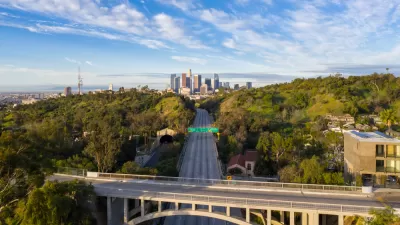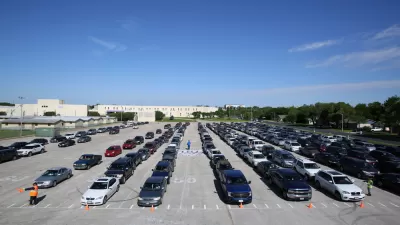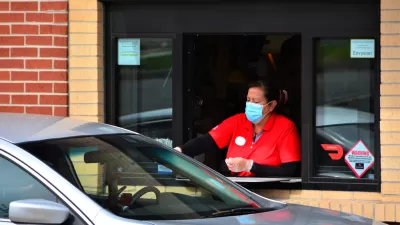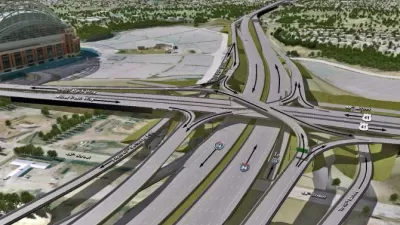We can't go back to the way of life that makes pollution and climate change acceptable, according to multiple articles published on and around Earth Day. It's time for change.

Multiple writers in recent days and weeks have smelled and tasted the clean air in cities during the COVID-19 stay-at-hime-orders and called for collective action to alter the course of humanity. After a clean air experience like this, amidst a crisis worsened by the effects of air pollution, how could humanity return to its normal, polluting ways?
Each of these articles tends to focus on the damage of the transportation status quo, and calls for individuals to make a change in their daily habits.
"We can’t unsee the clearer skies, so let’s incorporate some of the changes we’ve made during the shutdown, such as making fewer trips to the store and for some, perhaps working from home with more regularity," writes Sue McMillin for The Denver Post.
Cars are a frequent source of anti-pollution critiques in these stories. For the Los Angeles Times, Matthew Fleischer writes very specifically to address the cars polluting effect:
So how did we get here? Coronavirus lockdowns, sure. But, to be clear, we’re still burning fossil fuels to power our homes. Many businesses are shut, but essential heavy industries are still up and running. Supply trucks are still delivering goods for us to buy.
The difference is cars. Or lack thereof. Trapped indoors, people are no longer driving their cars anywhere and everywhere.
An article by On Barak for Quartz broadens the car criticism to include the entire fossil fuel economy, calling attention to the failure to truly account for the environmental consequences of human behavior on the global scale:
Most people attend only to one side of the equation that connects coronavirus and oil, to the effect rather than the cause: In this perspective, an epidemic closes factories and grounds airline and marine transportation, slows economic growth and reduces the demand for energy. These effects result in declining oil prices and could potentially ignite price wars that collapse the stock markets. While we obsess about what it may do to our bodies and communities, as far as oil is concerned, the virus is an economic abstraction. Even when we do notice the material aspects of this process, these are usually downstream: the clearing of air pollution over Wuhan or the reduction of greenhouse gas emission resulting from economic slowdown. We have grown so justifiably concerned with climate change and so unforgivably accustomed to fossil energy that we notice it only in its absence.
Finally, an article by Danielle Muoio for Politico frames the need for environmental improvements after the end of the coronavirus in terms of environmental justice.
Black and Hispanic residents have significantly higher death rates from the coronavirus than their white counterparts, often due to higher rates of pre-existing respiratory conditions. Those conditions trace their roots, in part, to living in highly polluted areas of the city.
Muoio reports that New York City Environmental Justice Alliance has recently published its "2020 NYC Climate Justice Agenda," which connects the current experience of COVID-19 with the future experiences of climate change (more on that, here), if cities like New York City don't make drastic changes to reduce pollution and emissions.
FULL STORY: Opinion: Coronavirus shutdowns are making it undeniably clear how toxic our car culture is

Trump Administration Could Effectively End Housing Voucher Program
Federal officials are eyeing major cuts to the Section 8 program that helps millions of low-income households pay rent.

Planetizen Federal Action Tracker
A weekly monitor of how Trump’s orders and actions are impacting planners and planning in America.

Ken Jennings Launches Transit Web Series
The Jeopardy champ wants you to ride public transit.

Washington Legislature Passes Rent Increase Cap
A bill that caps rent increases at 7 percent plus inflation is headed to the governor’s desk.

From Planning to Action: How LA County Is Rethinking Climate Resilience
Chief Sustainability Officer Rita Kampalath outlines the County’s shift from planning to implementation in its climate resilience efforts, emphasizing cross-departmental coordination, updated recovery strategies, and the need for flexible funding.

New Mexico Aging Department Commits to Helping Seniors Age ‘In Place’ and ‘Autonomously’ in New Draft Plan
As New Mexico’s population of seniors continues to grow, the state’s aging department is proposing expanded initiatives to help seniors maintain their autonomy while also supporting family caregivers.
Urban Design for Planners 1: Software Tools
This six-course series explores essential urban design concepts using open source software and equips planners with the tools they need to participate fully in the urban design process.
Planning for Universal Design
Learn the tools for implementing Universal Design in planning regulations.
Heyer Gruel & Associates PA
Ada County Highway District
Institute for Housing and Urban Development Studies (IHS)
City of Grandview
Harvard GSD Executive Education
Toledo-Lucas County Plan Commissions
Salt Lake City
NYU Wagner Graduate School of Public Service





























